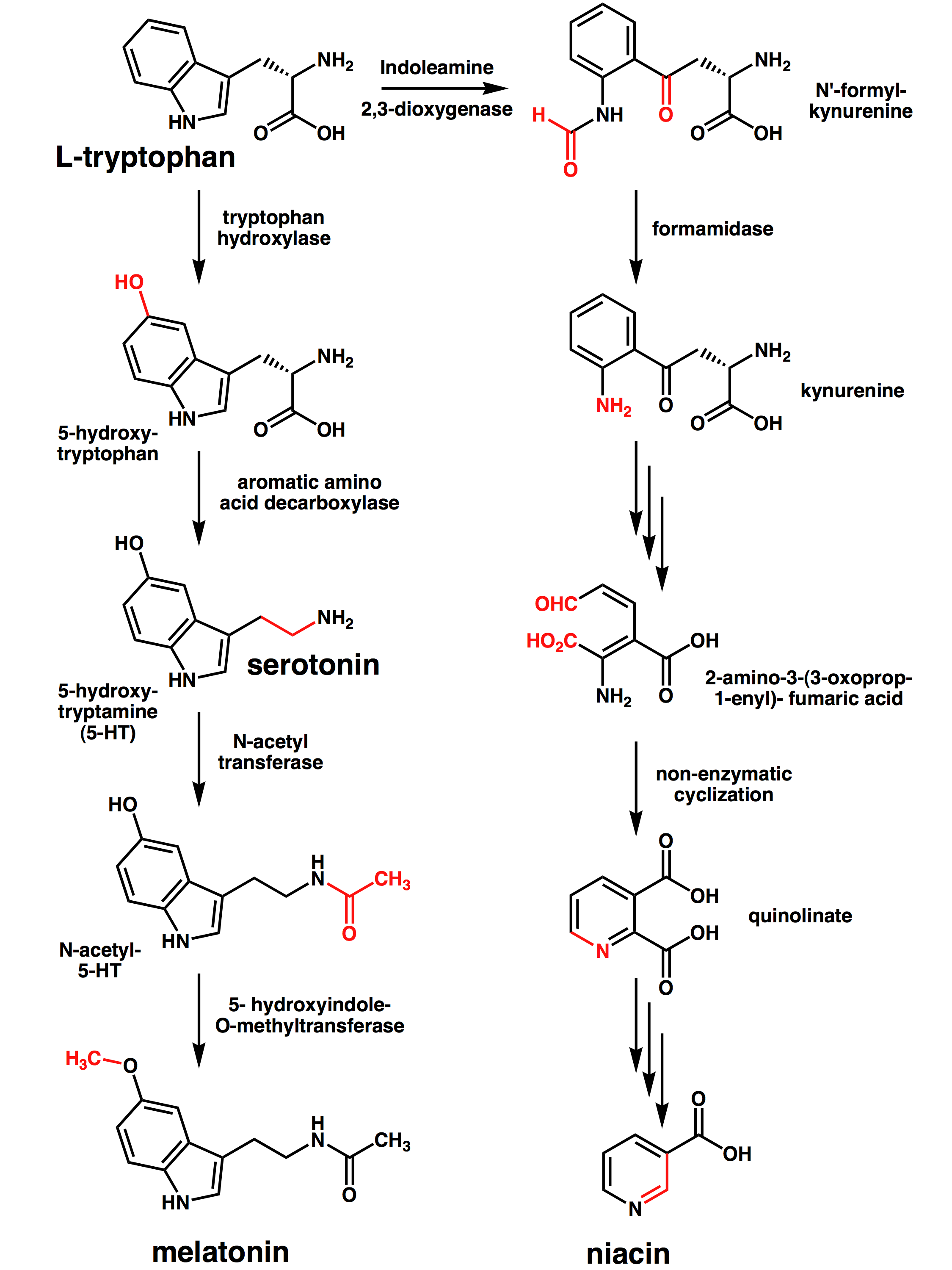Metabolism of Tryptophan and MCQs for GPAT, NEET, CSIR NET, UPSC, SSC
Tryptophan is an essential amino acid which contains indol ring side chain. Oxidization of tryptophan produces alanine which is glucogenic and acetyl-CoA which is ketogenic. It acts as a precursor for synthesis of-
- Vitamin B3 (niacin)
- Serotonin
- Melatonin
Metabolism of tryptophan occurs through two pathways-
- Kynurenine pathway:- In this pathway, tryptophan is oxidized to form kynurenine and alanine. Kynurenine is further converted to rather vitamin B3 or acetyl-CoA.

- Serotonin Pathway
- Tryptophan is first oxidized to 5-hydroxy-tryptophan by tryptophan hydroxylase, and require tetrahydrobiopterin as a cofactor
- 5-hydroxy-tryptophan undergoes decarboxylation to form serotonin.
- Acetylation of serotonin and its methylation in the pineal gland forms melatonin.

Serotonin:-
It is a neurotransmitter which is synthesized in neuron cell and acts as exitary hormone. In mammals, serotonin is largest synthesized in the intestinal cells. Deficiency of serotonin reduces brain activity and lead to depression.
Degradation of serotonin occurs through monoamino oxidase (MAO) enzyme which degrades serotonin into 5-hydroxyindoleacetate (5HIA) which is then excreted through urine.
Functions of Serotonin
- It works as vasoconstrictor
- It is involved in regulation of cerebral activity.
- It controls behavioural patterns, sleep, B.P, body temp etc.
- It is also necessary for the GIT peristalsis.
Melatonin:-
Melatonin is synthesized in pineal gland from serotonin in dark (usually at night). Serotonin acts upon N-acetylase enzyme to form N-acetyl-serotonin. Then it undergoes methylation to produce melatonin or N-acetyl 5-methoxyserotonin
Functions of Melatonin
- It acts as an inhibitor to melanocyte stimulating hormone (MSH) and ACTH.
- It Is a sleep inducing substance
- helps in reproductive functions.
Multiple choice questions (MCQs)
1. Other than serotonin and melatonin, tryptophan acts as a substrate for the synthesis of ——?
A. FAD+
B. NAD+
C. NADPH
D. Both A and C
2. What is the oxidative product of tryptophan?
A. Alanine
B. Acyl-CoA
C. Acetyl-CoA
D. Both A and C
3. Tryptophan acts as a precursor for the synthesis which vitamin? A. Vitamin k
B. Vitamin B12
C. Vitamin D
D. Vitamin B3
4. Which of the following compound act as cofactor for tryptophan hydroxylase?
A. Lactate
B. Pyruvate
C. Tetrahydrobiopterin
D. None of the above
5. Match the following enzyme and its substrates-
a. Tryptophan pyrolase 1. N-acetylserotonin
b. Kynureninase 2. 5-hydroxy tryptophan
c. Decarboxylase 3. 3-hydroxy kynurenine
d. Methyl transferase 4. L-tryptophan
6. Serotonin is synthesized in which cell?
A. Liver cell
B. Muscle cell
C. Neuron cell
D. Both A and B
7. Which of the following enzyme is known as PLP-dependent enzyme?
A. Tryptophan hydroxylase
B. Formamidase
C. Kynureninase
D. N-acetyl transferase
8. Melatonin act as an inhibitor for which hormone?
A. insulin
B. ACTH
C. Glucagon
D. All of the above
9. Which is the metabolic product of alanine?
A. Glucogenic
B. Ketogenic
C. Both
D. None
10. Which enzyme degrades serotonin to 5-
hydroxyindoleacetate?
A. Mono-amine oxidase
B. Di-amine oxidase
C. Tri-amine oxidase
D. Tetra amine oxidase
11. Which of the following statement is NOT true?
A. Melatonin is a hormone
B. Serotonin is also called as 5-hydroxytryptamine
C. Xanthurenate is toxic and cannot be excreted in urine
D. vitamin B3 is also known as niacin
12. Which organ is affected due to the deficiency of serotonin?
A. brain B. Heart
C. stomach D. Kidney
13. 5-hydroxy-tryptophan undergoes which type of reaction to form serotonin?
A. Carboxylation
B. Dehydrogenation
C. Hydration
D. None of the above
14. Which of the following enzyme is involve in serotonin pathway? A. Tryptophan hydroxylase
B. Acetyl transferase
C. Methyl transferase
D. All of the above
15. Which of the following act as precursor for the synthesis of melatonin?
A. Pyruvate
B. Acetyl-CoA
C. Serotonin
D. Lactate
ANSWERS:-
- NAD+
- Both A and C
- Vitamin B3
- Tetrahydrobiopterin
- a – 4 b – 3 c – 2 d – 1
- Neuron cell
- Kynureninase
- ACTH
- Glucogenic
- Mono-amine oxidase
- Xanthurenate is toxic and cannot be excreted in urine
- Brain
- None of the above
- All of the above
- Serotonin
Participate in Online FREE GPAT TEST: CLICK HERE
Participate in Online FREE Pharmacist TEST: CLICK HERE
Participate in Online FREE Drug Inspector TEST: CLICK HERE
Participate in CSIR NET JRF Mock Test
REFERENCE:–
1. Pankaja Naik- Biochemistry; 4th edition; page no:-283-285.
2. U Satyanarayana, U Chakrapani-Biochemistry; 4th edition; page no:- 356, 358.